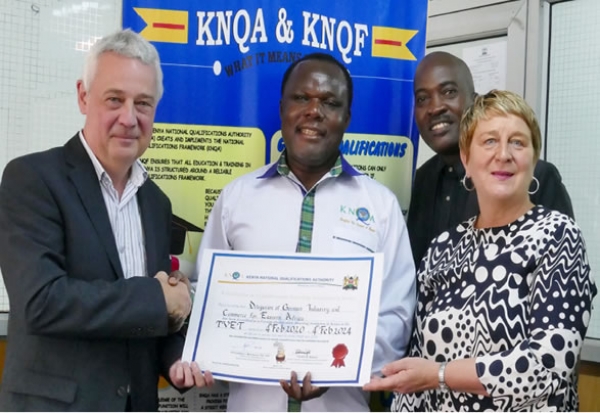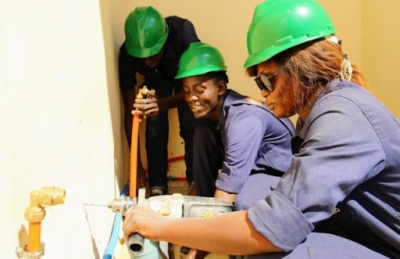Economies in Sub-Saharan Africa with its GDP growing steadily at 5% per annum since 2013. The biggest contributors to this growth have been agriculture, transport, storage, manufacturing, wholesale and retail sectors. The impressive growth rates, pre-COVID, witnessed in the hospitality, information, communication, transportation and sectors cannot also go without a mention. Yet, despite this impressive performance, skills shortages, high unemployment rates and mismatch of skills continue to plague the vitality of the economy.
However, since 2014, the Kenyan government has sought to address these challenges by various interventions. One such intervention is reforms in the TVET sub sector, targeted at addressing the skills mismatch and gaps thereof. Working with development agencies and other key stakeholder in the TVET subsector, the government purposefully set out to improve on the delivery of TVET training in the country. The “Skills Expert Project”, a skills development program initiated and supported by the Federal Government of Germany, is one is one of the pioneering programs mooted to champion the transformation of TVET training in Kenya.
Launched in late 2017, by the German Federal Ministry of Economy and Energy, and the Delegation of German Industry and Commerce for Eastern Africa (AHK), the Skills Expert Project is a vocational training program that combines learning at a TVET educational institution with learning at the work place. Referred also as the Dual VET program, this system has been the corner stone of the German education system and is the reason for its strong industrial base.
As a viable option to the competency based education and training system, (CBET), the Dual VET seeks to address the drawback of focusing exclusively on a class/school based training which has been the main learning method in Kenya. By adopting the dual program for TVET, it was envisaged that the country would succeed in improving the quality of its graduates. Such that graduates will not only be better prepared for the work place but would also possess the skills that are actually needed.
A look into Dual VET, as an alternative path to learning
The Dual vocational education and training system stands out due to the two coordinated learning approaches. Learning at the employer (company) and learning at vocational school. The way it is designed is that the bulk of learning takes place at the company; with 60-70% of the time being spent at the company versus 40-30% being spent at school. To this end, the elements of theory are learnt at school, while application and practical aspects are learnt at the work place.
Since the start of the Skills Expert Project in 2017, tremendous progress has been attained. The AHK as the implementers in collaboration with TVET institutions and the government have worked towards adapting the German Dual system curriculum. This curriculum was reviewed by Kenya National Qualifications Authority (KNQA) and by the TVET Authority. Subsequently, KNQA accredited AHK in early 2020, as a Foreign Qualification Awarding Institution in Kenya for TVET Trainings. This means that certificates awarded by AHK Eastern Africa to trainees are now officially recognized in Kenya, and within the German system.
Overall, the central goal of the dual system is to help students attain and develop technical competencies, while nurturing their vocational aptitudes in school, so that they can meet their current and future professional challenges. In this regard, the dual system has outstanding potential to transform the private sector, reduce the unemployment within Kenya and in the long run boost and maintain overall economic growth.
Dual System in Action
For some time now, the AHK has been working in close collaboration with private sector organizations in the hospitality industry to roll out and establish the dual curriculum. Since its inception there have been some great successes and notable wins.
(i) 1st Chef Apprentice Program
The AHK, together with the Intercontinental Hotel Group, Tribe/Trademark Hotel and the German School, and in collaboration with Kibodeni College of Hospitality, rolled out the 1st Chef Apprentice Program. Through this program the first cohort of Chef Apprentices on the dual VET diploma program were trained for 3 years and completed their studies in August 2021, they sat their final examination in September. Upon successful graduation they will be awarded a double certification that includes German Level B and a Kenyan Diploma by the AHK.
The AHK together with, Movenpick Hotel, LSG Skychefs and The Nairobi Street Kitchen and in collaboration with the TVET arm of the Kenya Methodist University are scheduled to begin the 2nd Chef Apprentice Program, the intake is ongoing (October 2021). A similar program shall be rolled out in Mombasa later in the year. This will involve with Diani Beach Hotels; including Diani Sea Resort, Diani Sea Lodge, Neptune Hotels, and the Leopard Beach Hotel. This comes with a strong backing from the Kenya Association of Hotel Keepers and Caterers at the coast.
(iii) Other Dual Training programs in the pipeline
The AHK is preparing to introduce new dual training programs for logistics, shoe manufacturing, Pharma and Electronics. Already 24 students have attained dual training certification in Electronic Devices and Systems, after a 13 months course at the Kenya Technical Trainers College.
Lastly, AHK is also one of the key partners in the implementation of the Kenyan-German Initiative for Youth Employment, a collaborative program by the Kenyan and German governments to implement dual (Cooperative) vocational training scheme. The program has established 3 centers of excellence for Industrial Mechatronics, Automotive Mechatronics and Autobody at Kiambu Institute of Science and Technology (KIST), Nairobi Technical Training Institute (NTTI), Thika Technical Training Institute respectively.
Quality training for quality output
To enhance the quality of vocational training in Kenya, AHK Eastern Africa has introduced the “Training of Trainers (AdA) International” a vocational trainer qualification course. This specialized course targets in-company trainers who are responsible for planning training content and for conducting in-company vocational training programs as well to upskill vocational school teachers in pedagogy and didactics. As TVET shifts towards competency-based training, the vocational trainer qualification will assist to build the capacity of trainers in the across various TVET and work place institutions. It is noted that most trainers in the workplace already have professional and occupational experience, but lack the pedagogical competencies, essential in implementing Dual Vocational Education and Training. Thus these trainers will enable the effective and efficient transfer of knowledge, skills and attitudes to trainers. The training is oriented according to the German Quality Standards AEVO.
AHK has so far conducted over 15 AdA International courses reaching 170 participants across several government agencies, training institutions, industries and organizations. Through the delivery of these train the trainer (TOT) courses, trainers have gained the adequate skillset to facilitate training in their specific companies and institutions and have a better understanding of the dual program.
The go-to TVET Experts
Due to its rich multicultural knowledge, experiences and expertise, the AHK offers TVET Consulting services while working closely with local industry stakeholders. The AHK advises on Dual Vocational Training standards, policy and practice in the region. Through its umbrella organization DIHK (Association of German Chambers of Commerce and Industry) and the 79 regional chambers (IHKs) in Germany, the Delegation of German Industry and Commerce for Eastern Africa supports companies in the development of dual vocational training programs. Through information sessions on the dual vocational training concept, curriculum development and customization, dual certification with German system elements and much more.
Going beyond its direct mandated activities, AHK is also one of the founders, trustees and secretariat of the Permanent Working Group on TVET, a multi-stakeholder platform that promotes collaboration and provides guidance on the implementation of TVET reforms in Kenya.
If you would like to learn more about the Dual System of Vocational Education and Training (VET) please visit the AHK website https://www.kenia.ahk.de/ or contact the team via email at This email address is being protected from spambots. You need JavaScript enabled to view it.
WORK READINESS THROUGH APPRENTICESHIP: A CASE FOR ADOPTION OF DUAL SYSTEM
 Left - Bruno Backes, Head of Vocational Training, Delegation of German Industry & Commerce in Kenya (AHK). Centre - Dr Juma Mukhwana, Director General, Kenya National Qualification Authority (KNQA). Right - Maren Diale, Country Director, Delegation of German Industry & Commerce in Kenya (AHK). Back right - Frank Mukuna, former Deputy Director of RAD KNQA
Left - Bruno Backes, Head of Vocational Training, Delegation of German Industry & Commerce in Kenya (AHK). Centre - Dr Juma Mukhwana, Director General, Kenya National Qualification Authority (KNQA). Right - Maren Diale, Country Director, Delegation of German Industry & Commerce in Kenya (AHK). Back right - Frank Mukuna, former Deputy Director of RAD KNQA
© Copyright 2026 EdSource Africa by BIL






